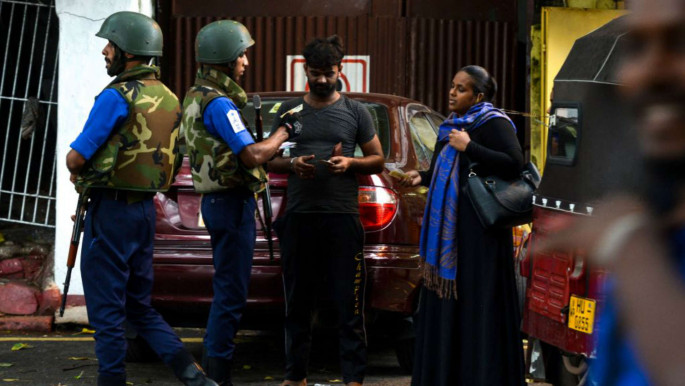
For my Muslim family in Sri Lanka, life has changed forever
The deplorable terrorist attacks on Easter Sunday which claimed the lives of 253 people and left 500 injured, have shaken Sri Lankans and their international brothers and sisters.
The attacks were claimed by Islamic State (IS) and carried out by the National Thowheed Jamath, a relatively little known extremist group who have gone against the very faith they claim to be part of.
As a British Sri Lankan Muslim myself, I stand united in solidarity with the victims of this tragedy and want the perpetrators to be caught and held accountable for the harm they have inflicted on people of many diverse communities.
The actions of these extremists are antithesis of the teachings of Islam - a religion which promotes peace and unity. In fact, Islam calls to protect Christians and their places of worship. Muslims around the world have deeply condemned these attacks, and want to extend their support to the entire Sri Lankan community.
But a week and a half after the attacks, many Sri Lankan Muslims now fear the thought of even stepping outside of their homes, despite wanting to support the community they grieve as one with.
My family in Sri Lanka have not left their houses since last Sunday out of fear of the backlash. Some of my cousins have not gone back to work, not sent children to school and other family members have closed their businesses from fear of being reprimanded for the attacks which they had nothing to do with, and strongly condemn.
 |
Some of my cousins have not gone back to work, not sent children to school and other family members have closed their businesses |  |
Many Sri Lankan Muslims fear reprisals against them since reports surfaced that some Muslim businesses had been torched and vandalised in retaliation. My own uncle, who had opened his shop briefly, was approached by a member of the public spewing anti-Muslim sentiment. Since then it has been closed and he's been confined to his home.
For the first time in years, the mosques were shut for Friday prayers and Muslims do not feel safe to attend. They have been advised to stay away from the mosque while the terrorists are still at large.
Frustrating for many Sri Lankans is the knowledge that the All Ceylon Jamiyathul Ulama (AJCU), the top Islamic body in Sri Lanka, had submitted reports about the NTJ to the government in January 2019, and called for the arrest of the group. Yet their calls were unheeded.
 |
|
| Any face covering that 'hinders the identification of individuals in a way that threatens national security' is now banned in Sri Lanka [Getty] |
Speaking at the meeting of religious and political leaders in Sri Lanka's parliament, Mufti Rizwi, President of the ACJU said that he had submitted all the information about potential links to IS terrorists in Sri Lanka, and stated
"I asked them to arrest them. But, they told me that they will take them in for rehabilitation but nothing was done. I was the first person to reveal the presence of IS terrorists in Sri Lanka way back in 2014."
If this is true, why weren't the suspects arrested when they were brought to the attention of Sri Lankan intelligence?
Read more: Sri Lanka names perpetrators of Easter Sunday massacre
Why was nothing done about these groups, if the ACJU had warned authorities several times of this threat? A memo was even sent to police regarding a suspected attack on churches. Muslims who had heard about this group had reported them and stated that they have nothing to do with Islam, and are determined to cause divisions in the community.
Many questions remain unanswered, such as if the authorities had acted on information supplied to them, whether the tragedy could have been averted.
 |
Many Sri Lankan Muslims fear reprisals against them since reports surfaced that some Muslim businesses had been torched |  |
Sri Lanka called for a ban on all face veils this week. The ACJU had issued similar advice to all Muslim women to remove the face veil when necessary for security reasons, but Muslims will undoubtedly will face more scrutiny just for being visibly Muslim, and there are concerns that anti-Muslim sentiment is on the rise again. Indeed, a knee-jerk ban on the veil risks stigmatising Muslim women unnecessarily.
Calls for peace and harmony have been issued by faith leaders such as the Archbishop of Colombo Cardinal Malcolm Ranjith. Buddhists, Hindus, Christians and Muslims have donated blood, held peace walks and vigils and some Sri Lankan Muslims have invited Christians to pray in their mosques, displaying banners saying "We stand against extremism and terrorism".
These are the actions our community needs in the wake of such a tragedy. Terrorism has no religion, and we must not allow it to have one. Now is a time to come together in peace and unity, to ensure that we never let the terrorists succeed in causing a divide between the peaceful communities of Sri Lanka.
Tasnim Nazeer is an award-winning journalist, author, and Universal Peace Federation Ambassador. She has written for Al Jazeera, The Guardian, The Huffington Post, Middle East Eye, CNN, BBC, and others. She was awarded the FIPP the global network of media Rising Stars in Media Award 2018.
Follow her on twitter: @tasnimnazeer1
Opinions expressed in this article remain those of the author and do not necessarily represent those of The New Arab, its editorial board or staff.





 Follow the Middle East's top stories in English at The New Arab on Google News
Follow the Middle East's top stories in English at The New Arab on Google News


